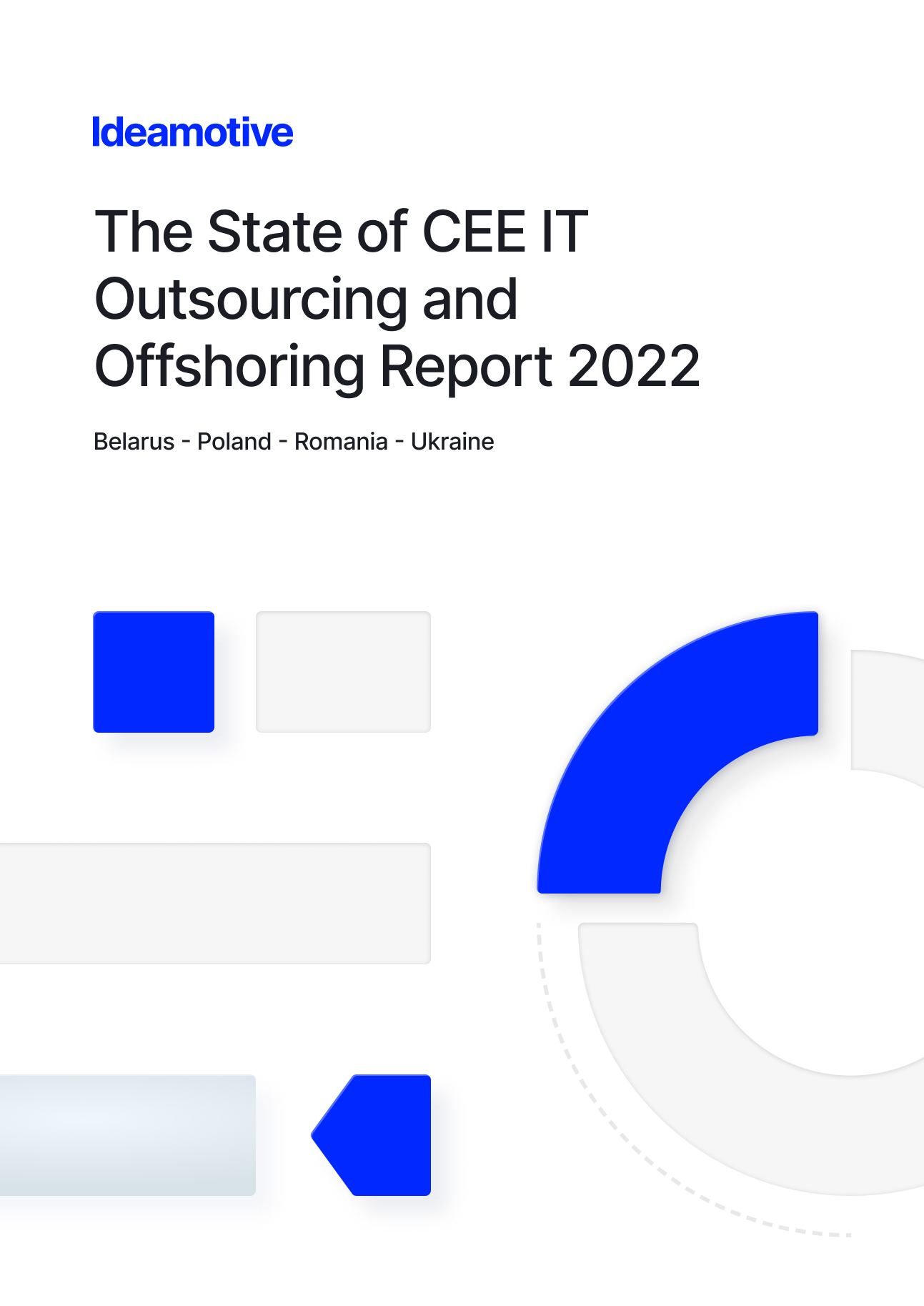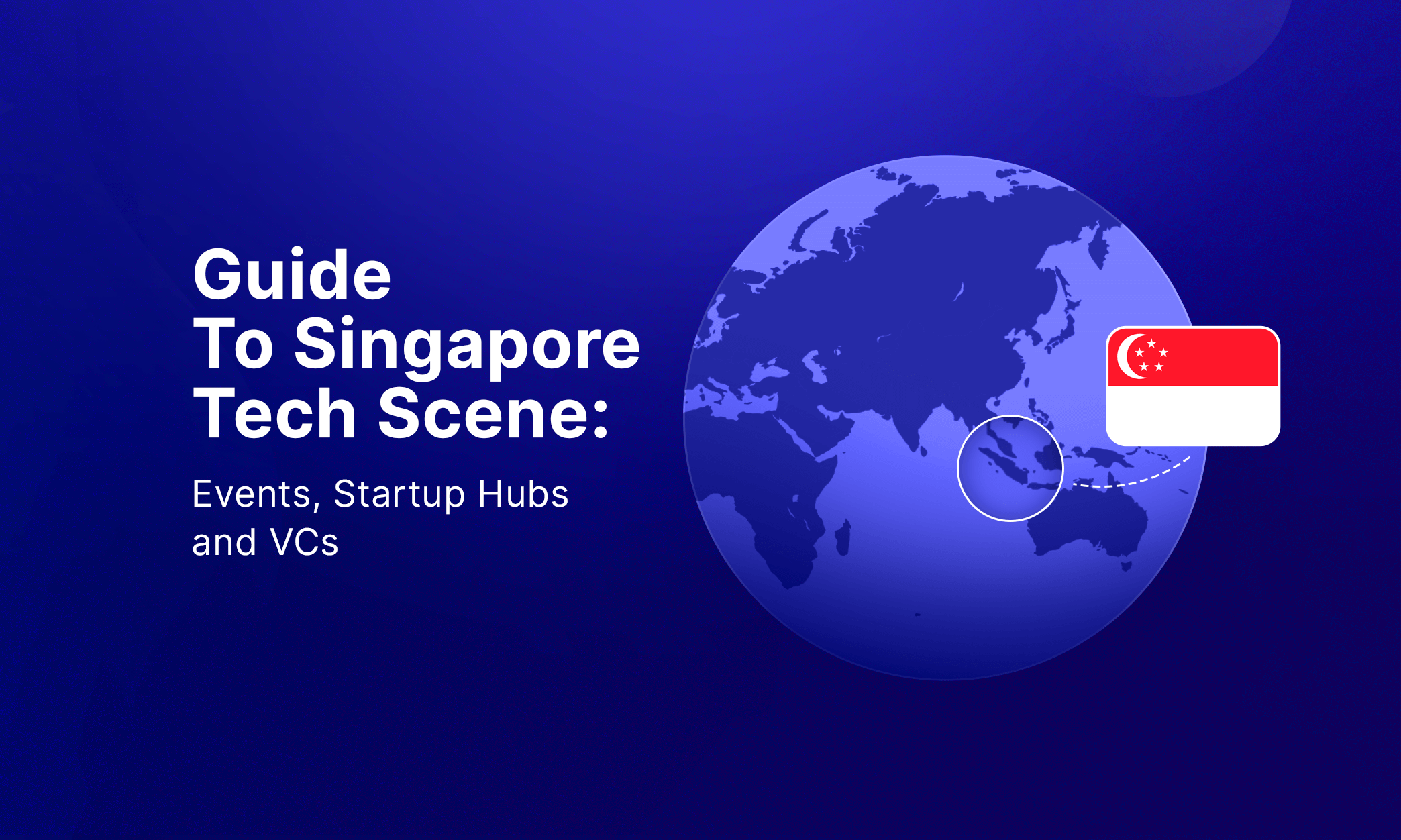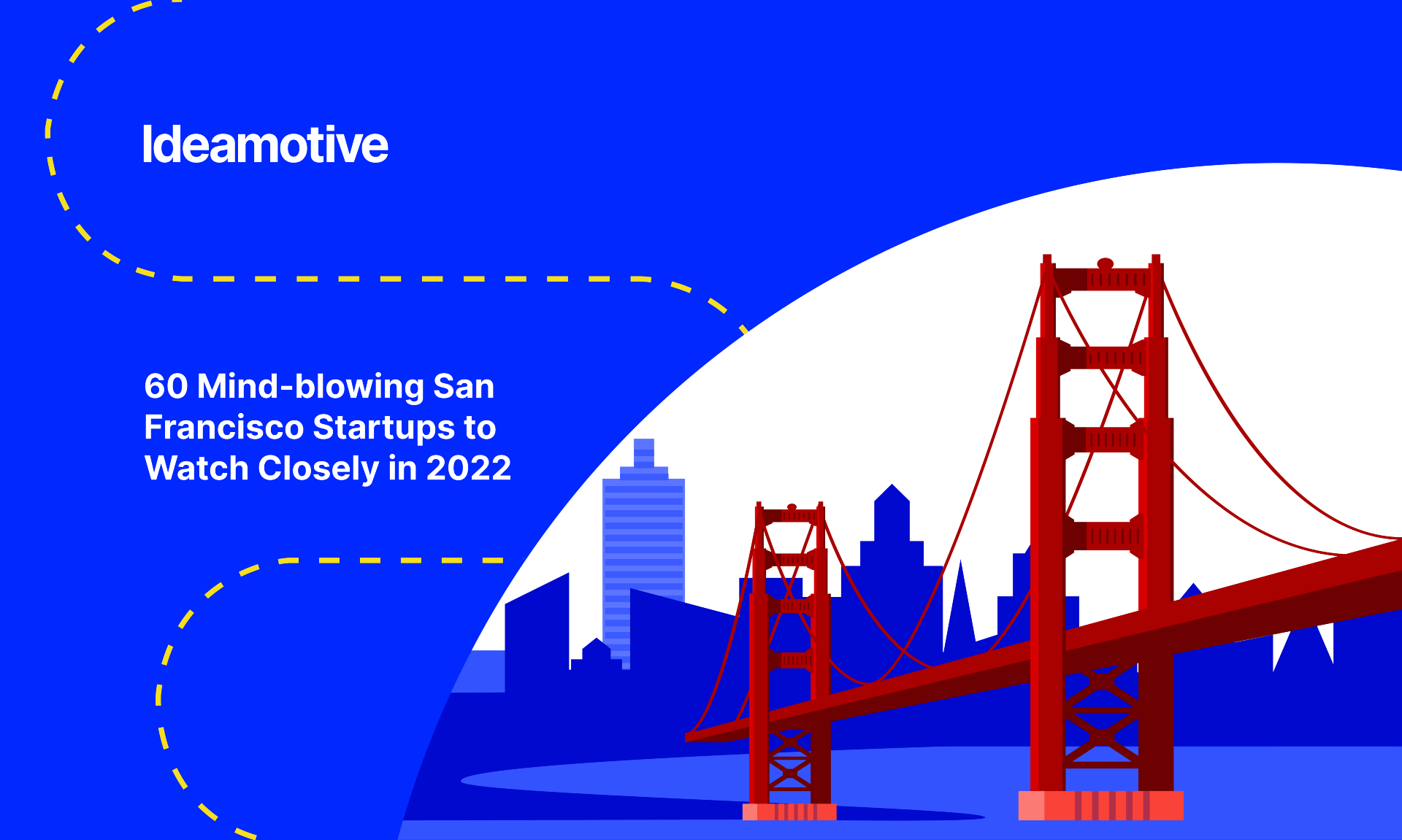2022 Guide To Chicago Tech And Startup Scene
Jan 11, 202210 min read

Michał Rejman
Chief Marketing Officer of Ideamotive. Travel addict and remote work advocate.

Chicago is not only jazz and mafia, but also startups. KPMG reports Chicago as a contender to be an international hub for innovation: In 2016, Chicago startups raised $ 1.7 billion, and Uptake surpassed Slack and Uber as the most attractive companies of 2015.
By reading this article, you’ll get to know why the Chicago tech scene is a competitor to Silicon Valley, and the lack of "other people's money" plays into its hands (spoiler: Chicagoans are used to "living on their own ones").
What makes Chicago tech scene unique
Chicago is among the first to increase the number of jobs in the US tech sector: many IT and tech companies have offices in and around Chicago (Salesforce, Google, CareerBuilder, Orbitz, Groupon, Redbox, Motorola).
But Chicago's unique asset is its culture.
Silicon Valley attracts techies, New York attracts big money, and Chicago attracts business leaders. The values of this metropolis are hard work, discipline, dedication, as well as pragmatism that limits creativity and thinking - but not in Chicago.
Features that overweight Silicon Valley’s ones
Today, venture capital is more available to the tech industry than ever before. After gaining the attention of venture capitalists, technology leaders are becoming more like celebrities than inventors.
When Snapchat was close to an inglorious fall, its CEO Evan Spiegel appeared on a fashion magazine cover. The behavior of Marissa Mayer and David Karp, and Dennis Crowley shows that today's technology leaders are more concerned with public attention than innovation.
US startups and particularly Silicon Valley’s are recruiting top talent from around the world and millions of dollars to come up with new uses for swiping and tapping on a smartphone screen - because they can, not because someone needs it.
Now recall electricity, plumbing, aeronautics, the theory of relativity - inventions and discoveries that shaped our species' evolution. All of them were created almost accidentally, not because a “big daddy” allocated funds for this.
Profitability is the best measure of success
Chicago does not like startups that cannot quickly make a profit: this is not pragmatic. It took Google, Uber, and Facebook years to become profitable. In Chicago, where profit is the yardstick, they would hardly be doing well.
Chicago entrepreneurs won't chase user growth by postponing monetization until later. Here, most companies are cash-driven and therefore have fewer deals, but the return on venture capital in Chicago is the highest in the country.
If in the Valley they believe that mistakes should be made "quickly and often," and the risks are mitigated by investors 'money, then pragmatic Chicago businessmen initially hunt for clients' money as the best confirmation of their business ideas.
The reason why the Chicago tech scene has always had less venture capital is a mystery. But because of this, the entry threshold for new companies is higher here. However, the lack of funding can even be beneficial - in such an environment, only the most significant innovations will develop.
How to do without external funding?
The birth of one of the greatest innovations in human history is a good example. The Wright Brothers' company, the Wright Cycle Company, manufactured and sold two models of bicycles - Dan Cleve and St. Clair. With the money raised, the brothers carried out aviation experiments and, with little expense, successfully developed their first aircraft. This pragmatic approach allows innovators to manage resources properly and form a strategy based on demand rather than on the wishes of investors.
Jason Freed followed the same approach when he brought his Basecamp user base to 15 million without outside funding. Basecamp emerged as an internal project management tool for web studio 37 Signals. The studio's clients asked permission to use it in their own projects. The audience grew - and as a result, Basecamp was brought to the market. It is one of the most popular project management tools today.
Takeaway
Silicon Valley's charm is waning, and perhaps Chicago's pragmatism will come in handy.
Dependence on venture capital has become a problem for the startup culture of Silicon Valley: the main thing is to charm investors, not to create a truly valuable product. And according to Chicagoans, if your business is unprofitable and you have no money for salaries and overheads, there is nothing to expect from you a revolution in technology.
Profitability is the best measure of success: it separates the wheat from the chaff and will one day make the US "second city" the first on the road to progress.
Best Chicago Startup & Tech conferences and events
TECHSPO Chicago 2021
Date: 9.05.2021 - 10.05.2021
Organizer: TECHSPO
Exhibition Center: Soldier Field Stadium
Link: https://techspochicago.com/about/
TECHSPO Chicago is a two-day technology show running from June 9-10, 2021, at the luxurious Soldier Field in Chicago, Illinois. This is probably one of the most famous Chicago tech events.
TECHSPO Chicago brings together app developers, brands, marketers, technology providers, software consultants, designers, innovators, and evangelicals looking to set the pace in our cutting edge technology world.
Showcasing next-generation technology and innovation; Internet, mobile communications, AdTech, MarTech, and SaaS technology, exhibitors have the opportunity to showcase their companies to consumers, top-level investors, crowds of the press, the most sought-after talents, and a large number of technology enthusiasts who want to celebrate an emerging enterprise.
Get ready to be inspired, surprised, and learn how these evolving technologies will impact your business for the better.
3rd Annual Blacks in Technology Conference
Date: 14.04.2021 - 16.04.2021
Organizer: Blacks in Technology
Link: 3rd Annual Blacks in Technology Conference - Chicago
In Spring 2021, Blacks in Technology will host their 3rd Annual Conference, also called BITCON, in Chicago, Illinois. BITCON, held in Twin Cities, Minnesota, over the past 2 years, will continue its trend of developing, diversifying, and popularizing technology ecosystems in the Midwest.
With initial support from the state of Illinois and corporations headquartered with a presence in the Midwest, BITCON will present a prospect that intersects technology and industry. Expecting more than 1,000 attendees from around the world, BITCON will highlight that Chicago is a place committed to increasing diversity and an equitable future for black women and men in technology. BITCON is committed to creating a platform for members to continue building their careers or technology business by providing the following:
- Training seminars
- Inspirational keynotes
- Curated panel discussions
- Corporate tours
- Networking events
- Competition
- Recruiting exhibitions
Chicago Venture Summit 2022
Date: TBA
Organizer: ChicagoNEXT
Link: http://www.chicagoventuresummit.com/
The Chicago Venture Summit will bring together some of the most influential venture capitalists, corporate venture capitalists, and business angels in the country who are connecting with high-potential startups from Chicago and throughout the Midwest.
The summit will curate a unique networking opportunity between Chicago's Fortune 500 leadership, its local investor community, and influencers in its growing innovation ecosystem.
Don’t miss a chance to visit one of the most popular Chicago startup events.
Startup community
Chicago City Tech Teams to Join
Illinois Technology Association (ITA)
ITA focuses on scaling Illinois technology companies and prides itself on being "the network you access, the resource you use, the advisor you trust."
IEEE Computer Society
The IEEE Computer Society is "the premier source of information, inspiration, and collaboration in the field of computer science and engineering." Founded in 1946, the IEEE Computer Society provides access to over 200 conferences, electronic libraries, journals, and more.
Code2040
Code2040 is a non-profit organization, “the largest community for racial equality in technology,” working to “remove structural barriers that prevent the full participation and leadership of black and Hispanic technologists in the innovation economy.”
Chicago Coworking Spaces
Whether you've found your dream job in high tech or want to bring your own ideas to life, a workspace outside the bedroom is often a good first step.
Here are some of the best Chicago tech scene coworking spaces available to you.
Industrious
Industrious is the city's leader in coworking, with eight beautiful spaces offering private offices and premium coworking options for teams of up to 100 people.
1871
1871 offers collaboration space as well as several private offices and meeting rooms that are suitable for the many stages of your company's growth. All the famous Chicago tech meetups are held here.
Life Working
In Life Working office spaces, you will feel “nice, clean, urban” with all the necessary amenities for your daily work. They also provide ongoing training and networking activities for members.
WeWork
WeWork is arguably the premier institution in coworking, providing entrepreneurs, freelancers, technicians, and innovators with a creative collaboration space to transform their ideas into something great.
Key Chicago City Tech Companies
The number of people hired by Chicago's largest tech companies grew 15 percent from 2016 to 2017, after growing 17 percent a year earlier.
Some of the largest tech companies in Chicago include:
Aon
Aon is "a leading global professional services company offering a wide range of risk, retirement, and healthcare solutions." Headquartered in Chicago, the company has over 50,000 employees in 120 countries around the world.
CNA
CNA is a technology insurance company that offers products such as computer insurance, hacker protection, and cloud coverage, among others. It employs over 7,000 people.
Slalom
Slalom, with over 500 employees in Chicago, is a consulting firm providing strategy, business transformation, and technology services with a focus on helping clients embrace new technologies and data.
ZS
Loop-based ZS employs over 4,500 people providing technology, marketing, and business services to companies around the world. ZS helps "customers develop new products and solutions to grow their business."
Motorola Solutions
Motorola Solutions is a provider of data and telecommunications equipment that replaced Motorola in 2011. The company's platforms are used, among other things, in command center software, video surveillance solutions, and managed and ancillary services. The company has 2,500 employees in Chicago and 17,000 employees worldwide.
TransUnion
Fintech company TransUnion aims to be more than a credit reporting agency, offering global risk intelligence to companies looking to use the information for good. The company employs 1,500 local employees and more than 5,200 employees worldwide.
HERE Technologies
HERE Technologies is a location platform that provides advertising data, device tracking, and live maps. The company, located in the West Loop area, has over 1,500 employees.
Grubhub
Grubhub is a mobile, online food ordering service currently operating in 2,400 cities and with over 125,000 restaurants. The company received $ 84.1 million in funding and now has 1,200 local employees and over 3,000 employees worldwide.
Gogo
Gogo, which employs over 1,100 people, is "the internet company that connects people while in the air." Their services allow passengers to work or be entertained during the flight.
Braintree
Braintree, the parent company of Paypal and Venmo, is behind the payment instruments of many leading companies, providing services such as fraud protection, data security, and payment authorization. They currently employ over 500 people.
Sprout Social
Sprout Social is a social media management platform that allows users to schedule posts, engage with followers, and track key metrics across major social media platforms. The company employs 450 people in 25 cities around the world. In 2018, the Chicago Tribune named it the Best Place to Work in Mid-sized Businesses for the fourth consecutive year.
Speaking of Sprout Social, Chicago-based startups raised nearly $ 1.4 billion in venture funding in 2018. A number of high-profile, fast-growing startups have led the way, including celebrity booking service Cameo, the data-driven pharmaceutical company Tempus, and G2 Crowd, a peer-to-peer platform that allows users to validate business software.
Meanwhile, large companies outside Illinois announced they are expanding their operations in Chicago. Facebook, for example, will open a 263,000-square-foot office in the city center with 500 new employees in the city. In the meantime, Google has leased an additional 132,000 square feet of office space in the Fulton Market area.
There are also several startups popping up in Chicago every year. You can read more about the Chicago tech newcomers in our separate article on the topic.
Why Chicago is a potential global tech leader?
Once overshadowed by Silicon Valley and New York City, Chicago is finally known for its fast-growing tech industry.
This is why Chicago is about to become a global technology leader.
Variety of companies
It seems like a wide variety of companies are looking to do business in Chicago.
Some of the top local tech talent employers include Motorola, Echo Global Logistics, and Groupon, which launched its business in Chicago in 2008. There are major success stories of startups in fintech (such as Braintree, acquired by PayPal), data science (Cleversafe, which was sold by IBM for $ 1.3 billion), and healthcare (IBM also acquired Merge Healthcare for $ 1 billion).
It also helps that the Midwest boasts a high concentration of large companies, including Kraft Heinz, General Mills, and Procter & Gamble. Better yet, these organizations have a proven commitment to supporting local startups.
Take Kraft, which launched an incubator for food and beverage startups called Springboard, dedicated to supporting brands that produce healthy, organic, experience-based products.
Meanwhile, Kellogg's was behind the venture capital fund Eighteen94 Capital, which promises to invest $ 100 million in startup companies, and 301 Inc. General Mills is focused on healthcare and wellness startups. Kellogg's contributed to the development of local life in other ways as well; In 2017, the company acquired RXBAR from Chicago for a staggering $ 600 million.
Other companies from outside Chicago have also pushed for a greater presence in the city. Salesforce, Facebook, LinkedIn, and Microsoft have recently expanded its operations in Chicago, while Google has grown from a small office opened at the turn of the millennium to Chicago with over 1,000 employees.
“The city's culture, diversity, and strong community focus have made it the ideal place to work for Google, and we look forward to further growth,” said Karen Souder, vice president of sales and site manager for Google Chicago.
Supportive government
Chicago's growth was supported by the government at several levels.
Mayor Ram Emanuel launched the city-wide technology strategy in 2013 after establishing ChicagoNEXT a year earlier, which is driving the Chicago technology scene around the world. In 2016, the State of Illinois established the Department of Innovation and Technology (DoIT) with the goal of updating the state's own technology infrastructure and creating a more efficient system overall.
Meanwhile, the University of Chicago's Edward L. Kaplan New Venture Challenge has completed over 230 startups that have reached over $ 13 billion in mergers and exits, including Grubhub, Braintree, and Simple Mills.
Chicago venture capital funding is on the rise
As we mentioned above, nearly $ 1.4 billion in funding was raised in 2018, and many Chicago-based companies had a lot to celebrate that year.
The leader was Tempus, a cancer data library platform for doctors, which raised $ 80 million in March and raised another $ 110 million in Series E in August, bringing the company value to over $ 2 billion.
Also of note is the Logistics Management Platform44 project, which raised $ 80 million in two rounds of funding in April and October. Unsurprisingly, the company was able to open new 42,000 square feet of office space at the Merchandise Mart. Once owned by Google, this space can accommodate up to 250 employees.
Healthcare solutions startup VillageMD also raised $ 80 million in January, allowing the company to double the number of primary care providers it supports and expand into markets, including Michigan and Georgia.
Reputation for innovation
The main reason for this optimism about the future of Chicago lies in its growing reputation for innovation.
KPMG recently surveyed over 750 global technology industry leaders and determined that Chicago ranks as the third-largest technology innovation hub in the United States, after Boston, after Silicon Valley and New York. Globally, Chicago entered the top ten. Likewise, the Innovative Cities Program ranked Chicago as the seventh-largest city in North America.
In the CompTIA Cyberstates Innovation 2018 report, Illinois was ranked sixth in innovation and fifth in high-tech employment.
Those who have seen growth up-close see no reason to believe Chicago’s momentum is on the verge of slowing.
“Entrepreneurs stay here and continue to reinvest,” said Alya Adamani Woods, chief executive of ChicagoNEXT. “They're not leaving Chicago. They stay here and start new companies, and that also keeps the interest here."
Summary
There are dozens of startup ecosystems in the world, but the best process of turning startups into billion-dollar companies occurs precisely in Chicago.
There is probably no one willing to invest in the high fashion industry in Kabul or Manila. Surely there, you can find a handful of consumers or a few inspiring ideas, but why the agony and risks when there is Paris or Milan - the world-renowned design capitals. A similar situation has developed in the field of the latest technologies - the United States sets high standards that the whole world is trying to meet.
In 2022, the leadership of the United States in the field of artificial intelligence, robotics, information technology, and so on is little threatened, which means that anyone who wants to capitalize on the explosive growth of innovations can invest in relevant companies from Chicago since the city is open for investment.
Nevertheless, if you still have any doubts or questions concerning the topic, feel free to contact highly experienced specialists from Ideamotive. We help startups manage and scale their development teams and provide top tech talent, including app developers in Chicago, across all industries.

Michał is a digital marketing veteran with a growth hacking mindset and 10+ years of experience. His goal is building high-quality technological content, with particular emphasis on React and Ruby on Rails. Traveler, climber, remote work advocate.
View all author posts
The State of Central & East Europe IT Outsourcing and Offshoring 2022 Report
Belarus • Poland • Romania • Ukraine
Read nowTrending articles
21 Dazzling Examples of Mobile App UI Design to Inspire You in 2023
Michał Pruciak 7 min read
MedTech vs HealthTech vs BioTech: What Are The Differences?
Michał Pruciak 7 min read
10 Business Applications of Neural Network (With Examples!)
Michał Pruciak 4 min read
10 Irresistible Examples of Web Design Best Practices for 2023
Adam Kozłowski 7 min read
21 Amazing Examples Of React Web Development
Michał Pruciak 14 min read

Looking for a specific type of business support service?
Rated 4.8 / 5.0 by clients from various industries and locations.





